A welfare coach to please them all
Page 23
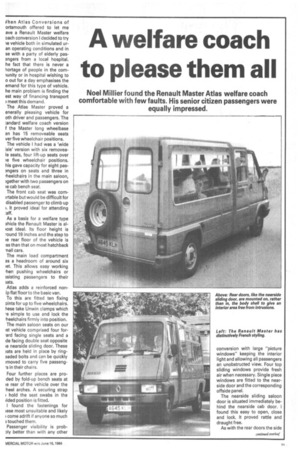
Page 24
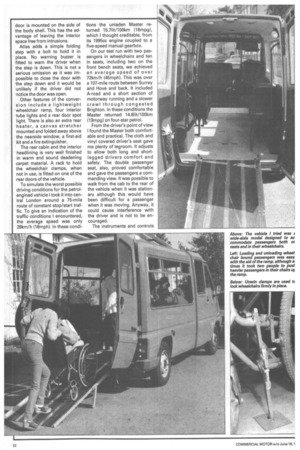
Page 25
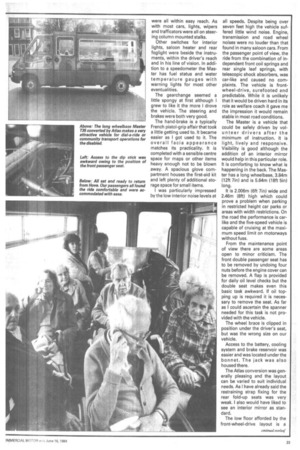
Page 26
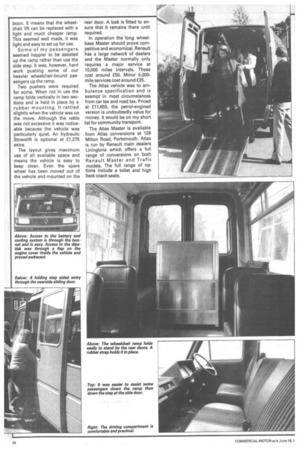
Page 28
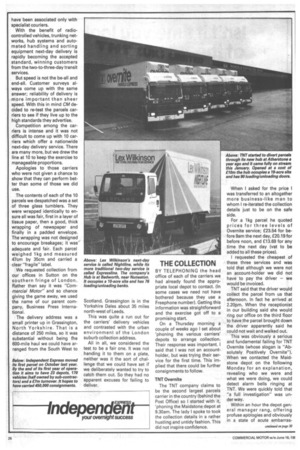
Page 32
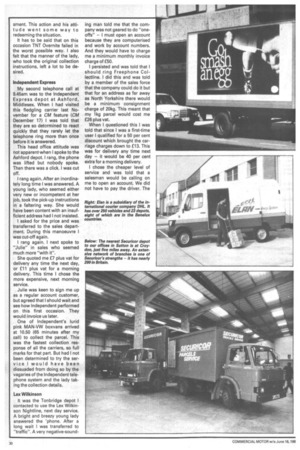
Page 33
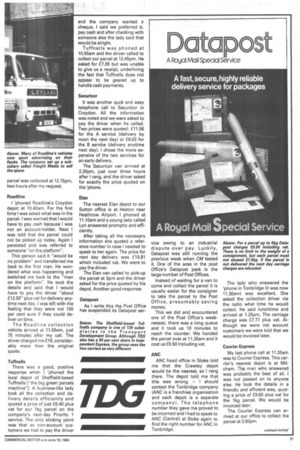
If you've noticed an error in this article please click here to report it so we can fix it.
Noel Millier found the Renault Master Atlas welfare coach comfortable with few faults. His senior citizen passengers were equally impressed.
Vhen Atlas Conversions of ortsmouth offered to let me ave a Renault Master welfare oach conversion I decided to try le vehicle both in simulated uran operating conditions and in se with a party of elderly pasangers from a local hospital. he fact that there is never a
hortage of people in the cornunity or in hospital wishing to o out for a day emphasises the ernand for this type of vehicle. he main problem is finding the est way of financing transport ) meet this demand.
The Atlas Master proved a enerally pleasing vehicle for 0th driver and passengers. The tandard welfare coach version f the Master long wheelbase an has 15 removeable seats ver five wheelchair positions. The vehicle I had was a 'wide isle' version with six removeale seats, four lift-up seats over le five wheelchair positions. his gave capacity for eight pasangers on seats and three in fheelchairs in the main saloon, )gether with two passengers on le cab bench seat.
The front cab seat was cornwtable but would be difficult for disabled passenger to climb up ). It proved ideal for attending taff.
As a basis for a welfare type Aide the Renault Master is allost ideal. Its floor height is round 19 inches and the step to ie rear floor of the vehicle is !ss than that on most hatchback mall cars.
The main load compartment as a headroom of around six let. This allows easy working 'hen pushing wheelchairs or ssisting passengers to their 3ats.
Atlas adds a reinforced nonip flat floor to the basic van. To this are fitted ten fixing Dints for up to five wheelchairs. hese take Unwin clamps which re simple to use and lock the 'heelchairs firmly into position. The main saloon seats on our ist vehicle comprised four forard facing single seats and a de facing double seat opposite le nearside sliding door. These 3ats are held in place by ringeaded bolts and can be quickly :moved to carry five passeng's in their chairs.
Four further places are proded by fold-up bench seats at ie rear of the vehicle over the 'heel arches. A securing strap ) hold the seat swabs in the )Ided position is fitted.
I found the fastenings for tese most unsuitable and likely ) come adrift if anyone so much ;touched them.
Passenger visibility is probDly better than with any other conversion with large "picture windows" keeping the interior light and allowing all passengers an unobstructed view. Four top sliding windows provide fresh air when necessary. Single piece windows are fitted to the nearside door and the corresponding offside panel.
The nearside sliding saloon door is situated immediately behind the nearside cab door. I found this easy to open, close and lock. It proved rattle and draught free.
As with the rear doors the side
door is mounted on the side of the body shell. This has the advantage of leaving the interior space free from intrusions.
Atlas adds a simple folding step with a bolt to hold it in place. No warning buzzer is fitted to warn the driver when the step is down. This is not a serious omission as it was impossible to close the door with the step down and it would be unlikely if the driver did not notice the door was open.
Other features of the conversion include a lightweight wheelchair ramp, four interior tube lights and a rear door spot light. There is also an extra rear heater, a canvas stretcher mounted and folded away above the nearside window, a first-aid kit and a fire extinguisher.
The rear cabin and the interior headlining is very well finished in warm and sound deadening carpet material. A rack to hold the wheelchair clamps, when not in use, is fitted on one of the rear doors of the vehicle.
To simulate the worst possible driving conditions for the petrolengined vehicle I took it into central London around a 75-mile route of constant stop/start traffic. To give an indication of the traffic conditions I encountered, the average speed was only 28km/h (18mph). In these condi tions the unladen Master returned 15.71it/100km (18mpg), which I thought creditable, from its 1995cc engine coupled to a five-speed manual gearbox.
On our test run with two passengers in wheelchairs and ten in seats, including two on the front bench seats, we achieved an average speed of over 72km/h (45mph). This was over a 107-mile route between Surrey and Hove and back. It included A-road and a short section of motorway running and a slower crawl through congested Brighton. In these conditions the Master returned 14.81it/100km (19mpg) on four-star petrol.
From the driver's point of view I found the Master both comfortable and practical. The cloth and vinyl covered driver's seat gave me plenty of legroom. It adjusts to allow both long and shortlegged drivers comfort and safety. The double passenger seat, also, proved comfortable and gave the passengers a commanding view. It was possible to walk from the cab to the rear of the vehicle when it was stationary although this would have been difficult for a passenger when it was moving. Anyway, it could cause interference with the driver and is not to be encouraged.
The instruments and controls were all within easy reach. As with most cars, lights, wipers and trafficators were all on steering column mounted stalks.
Other switches for interior lights, saloon heater and rear foglight were beside the instruments, within the driver's reach and in his line of vision. In addition to a speedometer the Master has fuel status and water temperature gauges with warning lights for most other eventualities.
The gearchange seemed a little spongy at first although I grew to like it the more I drove the vehicle. The steering and brakes were both very good.
The hand-brake is a typically French pistol-grip affair that took a little getting used to. It became easier as I got used to it. The overall facia appearance matches its practicality. It is completed with a sensible centre space for maps or other items heavy enough not to be blown away. A spacious glove compartment houses the first-aid kit and left plenty of additional storage space for small items.
I was particularly impressed by the low interior noise levels at all speeds. Despite being over seven feet high the vehicle suffered little wind noise. Engine, transmission and road wheel noises were no louder than that found in many saloon cars. From the passenger point of view, the ride from the combination of independent front coil springs and rear single leaf springs, with telescopic shock absorbers, was car-like and caused no complaints. The vehicle is frontwheel-drive, surefooted and predictable. While it is unlikely that it would be driven hard in its role as welfare coach it gave me the impression it would remain stable in most road conditions.
The Master is a vehicle that could be safely driven by volunteer drivers after the minimum of instruction. It is light, lively and responsive. Visibility is good although the addition of an interior mirror would help in this particular role. It is comforting to know what is happening in the back. The Master has a long wheelbase, 3.84m (12ft 7in) and is 5.64m (18ft 51n) long.
It is 2.006m (6ft 7in) wide and 2.46m (8ft) high which could prove a problem when parking in restricted height car parks or areas with width restrictions. On the road the performance is carlike and the five-speed vehicle is capable of cruising at the maximum speed limit on motorways without fuss.
From the maintenance point of view there are some areas open to minor criticism. The front double passenger seat has to be removed by undoing four nuts before the engine cover can be removed. A flap is provided for daily oil level checks but the double seat makes even this basic task awkward. If oil topping up is required it is necessary to remove the seat. As far as I could ascertain the spanner needed for this task is not provided with the vehicle.
The wheel brace is clipped in position under the driver's seat, but was the wrong size on our vehicle.
Access to the battery, cooling system and brake reservoir was easier and was located under the bonnet. The jack was also housed there.
The Atlas conversion was generally pleasing and the layout can be varied to suit individual needs. As I have already said the restraining strap fixing for the rear fold-up seats was very weak. I also would have liked to see an interior mirror as standard.
The low floor afforded by the front-wheel-drive layout is a boon. It means that the wheelchair lift can be replaced with a light and much cheaper ramp. This seemed well made, it was light and easy to set up for use.
Some of my passengers seemed happier to be assisted up the ramp rather than use the side step. It was, however, hard work pushing some of our heavier wheelchair-bound passengers up the ramp.
Two pushers were required for some. When not in use the ramp folds vertically in two sections and is held in place by a rubber mounting. It rattled slightly when the vehicle was on the move. Although the rattle was not excessive it was noticeable because the vehicle was particularly quiet. An hydraulic Stowalift is optional at £1,275 extra.
The layout gives maximum use of all available space and means the vehicle is easy to keep clean. Even the spare wheel has been moved out of the vehicle and mounted on the rear door. A lock is fitted to ensure that it remains there until required.
In operation the long wheelbase Master should prove competitive and economical. Renault has a large network of dealers and the Master normally only requires a major service at 10,000 miles intervals. These cost around £50. Minor 5,000mile services cost around £25.
The Atlas vehicle was to ambulance specification and is exempt in most circumstances from car tax and road tax. Priced at £11,655, the petrol-engined version is undoubtedly value for money. It would be on my short list for community transport.
The Atlas Master is available from Atlas conversions at 128 Milton Road, Portsmouth. Atlas is run by Renault main dealers Liningtons which offers a full range of conversions on both Renault Master and Trafic models. The full range of options include a toilet and high back coach seats. have been associated only with specialist couriers.
With the benefit of radiocontrolled vehicles, trunking networks, hub systems and automated handling and sorting equipment next-day delivery is rapidly becoming the accepted standard, winning customers from the two-to-three-day transit services.
But speed is not the be-all and end-all. Customer surveys always come up with the same answer; reliability of delivery is more important than sheer speed. With this in mind CM decided to re-test the parcels carriers to see if they live up to the high standards they advertise.
Competition among the carriers is intense and it was not difficult to come up with 10 carriers which offer a nationwide next-day delivery service. There are many more, but we drew the line at 10 to 'keep the exercise to manageable proportions.
Apologies to those carriers who were not given a chance to show that they can perform better than some of those we did use.
The contents of each of the 10 parcels we despatched was a set of three glass tumblers. They were wrapped identically to ensure all was fair, first in a layer of tissue paper, then a good, thick wrapping of newspaper and finally in a padded envelope. The wrapping was not designed to encourage breakages; it was adequate and fair. Each parcel weighed 1 kg and measured 47cm by 35cm and carried a • clear "fragile" label.
We requested collection from our offices in Sutton on the southern fringe of London. Rather than say it was "Commercial Motor" and so chance giving the game away, we used the name of our parent cornpany, Business Press International.
The delivery address was a small printer up in Grassington, North Yorkshire. That is a distance of 260 miles, so it was substantial without being the 600-mile haul we could have arranged from the South West to Scotland. Grassington is in the Yorkshire Dales about 35 miles north-west of Leeds.
This was quite a run out for the carriers' delivery vehicles and contrasted with the urban environment of the London suburb collection address.
All in all, we considered the test to be a fair one. It was not handing it to them on a plate, neither was it the sort of challenge that we could have set if we deliberately wanted to try to catch them out. So they had no apparent excuses for failing to deliver. BY TELEPHONING the head office of each of the carriers we had already found the appropriate local depot to contact. (In some cases we need not have bothered because they use a Freephone number). Getting this information was straightforward and the exercise got off to a promising start.
On a Thursday morning a couple of weeks ago I set about 'phoning the various carriers' depots to arrange collection. Their response was important. I said that I was not an accountholder, but was trying their service for the first time. This implied that there could be further consignments to follow.
TNT Overnite
The TNT company claims to be the second largest parcels carrier in the country (behind the Post Office) so I started with it, 'phoning the Maidstone depot at 9.30am. The lady I spoke to took the collection details in a rather hustling and untidy fashion. This did not inspire confidence. When I asked for the price I was transferred to an altogether more business-like man to whom I re-iterated the collection details just to be on the safe side.
For a lkg parcel he quoted prices for three levels of Overnite service; £23.54 for before 9am the next day, £20.19 for before noon, and £13.69 for any time the next day (vat to be added to all these prices).
I requested the cheapest of these three services and was told that although we were not an account-holder we did not have to pay the driver — we would be invoiced.
TNT said that the driver would collect the parcel from us that afternoon. In fact he arrived at 2.20pm. When the receptionist in our building said she would ring our office on the third floor to have the parcel brought down the driver apparently said he could not wait and walked out.
This was obviously a serious and fundamental failing for TNT Overnite (whose slogan is "Absolutely Positively Overnite"). When we contacted the Maidstone depot on the following Monday for an explanation, revealing who we were and what we were doing, we could detect alarm bells ringing at TNT. We were quickly told that "a full investigation" was under way.
Within an hour the depot general manager rang, offering profuse apologies and obviously in a state of acute embarras sment. This action and his attitude went some way to redeeming the situation.
It has to be said that on this occasion TNT Overnite failed in the worst possible way. I also felt that the manner of the lady, who took the original collection instructions, left a lot to be desired.
Independent Express My second telephone call at 9.45am was to the Independent Express depot at Ashford, Middlesex. When I had visited this fledgling carrier last November for a CM feature (CM December 17) I was told that they are so determined to react quickly that they rarely let the telephone ring more than once before it is answered.
This head office attitude was not apparent when I spoke to the Ashford depot. I rang, the phone was lifted but nobody spoke. Then there was a click. I was cut off.
I rang again. After an inordinately long time I was answered. A young lady, who seemed either very new or incompetent at her job, took the pick-up instructions in a faltering way. She would have been content with an insufficient address had I not insisted.
I asked for the price and was transferred to the sales department. During this manoeuvre I was cut-off again.
I rang again. I next spoke to "Julie" in sales who seemed much more "with it".
She quoted me £7 plus vat for delivery any time the next day, or £11 plus vat for a morning delivery. This time I chose the more expensive, next morning service.
Julie was keen to sign me up as a regular account customer, but agreed that I should wait and see how independent performed on this first occasion. They would invoice us later.
One of Independent's lurid pink MAN-VW boxvans arrived at 10.50 (65 minutes after my call) to collect the parcel. This was the fastest collection response of all the carriers, so full marks for that part. But had I not been determined to try the service I would have been dissuaded from doing so by the vagaries of the Independent telephone system and the lady taking the collection details.
Lex Wilkinson It was the Tonbridge depot I contacted to use the Lex Wilkinson Nightline, next day service. A bright and breezy young lady answered the 'phone. After a long wait I was transferred to "traffic". A very negative-sound ing man told me that the company was not geared to do "oneoffs" —I must open an account because they are computerised and work by account numbers. And they would have to charge me a minimum monthly invoice charge of £50.
I persisted and was told that I should ring Freephone Collectline. I did this and was told by a member of the sales force that the company could do it but that for an address as far away as North Yorkshire there would be a minimum consignment charge of 20kg. This meant that my 1kg parcel would cost me £26 plus vat.
When I questioned this I was told that since I was a first-time user I qualified for a 50 per cent discount which brought the carriage charges down to £13. This was for delivery any time next day — it would be 40 per cent extra for a morning delivery, I chose the cheaper level of service and was told that a salesman would be calling on me to open an account. We did not have to pay the driver. The parcel was collected at 12.15pm, two hours after my request.
Readline I 'phoned Roadline's Croydon depot at 10.40am. For the first time I was asked what was in the parcel. I was warned that I would have to pay cash because I was not an account-holder. Next I was told that the parcel could not be picked up today. Again I persisted and was referred to someone "on the platform", This person said it ."would be no problem" and transferred me back to the first man. He wondered what was happening and switched me back to the "man on the platform". He took the details and said that I would have to pay the driver "about £12.50" plus vat for delivery anytime next day. L was left with the feeling that they were not 100 per cent sure if they could deliver on time.
The Roadline collection vehicle arrived at 11.55am, just 75 minutes after my call. The driver charged me £18, considerably more than the original quote.
Tuffnells There was a good, positive response when I 'phoned the local depot of Sheffield-based Tuffnells ("the big green parcels machine"). A business-like lady took all the collection and delivery details efficiently and quoted a price of just £6.40 plus vat for our 1kg parcel on the company's next-day Priority 1 service. The only sticking point
was ‘that as non-account customers we had to pay the driver and the company wanted a cheque. I said we preferred tc pay cash and after checking with someone else the lady said that would be alright.
Tuffnells was phoned at 10.55am and the driver called to collect our parcel at 12.45pm. He asked for £7.36 but was unable to give us a receipt, underlining the fact that Tuffnells does not appear to be geared up to handle cash payments.
Securicor It was another quck and easy telephone call to Securicor in Croydon. All the information was noted and we were asked to pay the driver when he called. Two prices were quoted; £11.56 for the A service (delivery by noon the next day) or £9.03 for the B service (delivery anytime next day). I chose the more expensive of the two services for an early delivery.
The Securicor van arrived at 2.20pm, just over three hours after I rang, and the driver asked for exactly the price quoted on the 'phone.
Elan The nearest Elan depot to our Sutton office is at Heston near Heathrow Airport. I phoned at 11.10arn and a young lady called Lyn answered promptly and efficiently.
After taking all the necessary information she quoted a reference number in case I needed to speak to her again. The price for next day delivery was £10.81 which included vat. We were to pay the driver.
The Elan van called to pick-up the parcel at 3pm and the driver asked for the price quoted by his depot. Another good response.
Datapost As I write this the Post Office has suspended its Datapost ser
vice owing to an industrial dispute over pay. Luckily, Datapost was still running the previous week when CM tested, it. One of the aces in the post Office's Datapost pack is the large number of Post Offices.
Instead of waiting for a van to come and collect the parcel it is usually easier for the consigner to take the parcel to the Post Office, presumably saving money.
This we did and encountered one of the Post Office's weaknesses; there was a long queue and it took us 10 minutes to reach the counter. We handed the parcel over at 11.20am and it cost us £9.50 including vat.
ANC ANC head office in Stoke told me that the Crawley depot would be the nearest, so I rang there. The depot told me that this was wrong — I should contact the Tonbridge company (ANC is a franchise organisation and each depot is a separate company). The telephone number they gave me proved to be incorrect and I had to speak to ANC (Central) at Stoke again to find the right number for ANC in Tonbridge. The lady who answered the 'phone in Tonbridge (it was now 11.30am) was excellent. She asked the collection driver via the radio what time he would collect. He said lunchtime and arrived at 1.25pm. The carriage charge was £7.77 plus vat. Although we were not account customers we were told that we would be invoiced later.
Courier Express My last phone call at 11.35am was to Courier Express. This carrier's nearest depot is at Mitcham. The man who answered was probably the best of all. I was not passed on to anyone else. He took the details in a friendly and efficient way, quoting a price of £9.60 plus vat for the 1 kg parcel. We would be invoiced later.
The Courier Express van ar rived at our office to collect the parcel at 3.50pm,




























































































